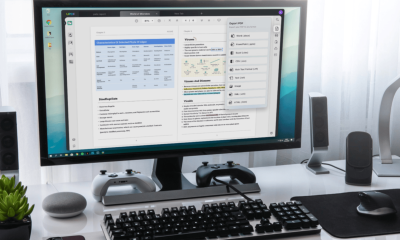Personal Finance
November inflation slows to 3.1%, led by falling gas prices

Consumer prices increased slightly in November after being unchanged in October, according to the Consumer Price Index (CPI) released by the Bureau of Labor Statistics (BLS).
On an annual basis, prices rose 3.1% in November, down from 3.2% growth last month and in line with economists’ expectations. Core inflation, which excludes more volatile food and energy prices, rose by 0.3% on a monthly basis after increasing 0.2% in October. On an annual basis, Core CPI held steady at 4% in November.
The decline in gas prices helped pull down overall inflation. Gas prices were down 6% in November from the prior month and have fallen 8.9% over the past year. Shelter costs continued to increase, rising 0.4% month over month and 6.5% year over year.
“Inflation still appears to be on a slow path to normalization, but the stickiness of core prices in a range well above the Fed’s target could give policymakers reason to hold rates steady for the time being,” Jim Baird, Plante Moran Financial Advisors’ chief investment officer said in a statement. “The worst of the inflation scare is behind us, but labor conditions are still relatively tight, keeping upward pressure on wages still firmly on the radar for policymakers. “
If you are struggling with high inflation, you could consider taking out a personal loan to pay down debt at a lower interest rate, reducing your monthly payments. You can visit Credible to find your personalized interest rate without affecting your credit score.
HOMEOWNERS COULD SAVE TENS OF THOUSANDS IN DAMAGES BY USING SMART DEVICES
Shelter costs are trending down
Shelter costs rose 6.5% in November, dropping from 6.7% in October to register the smallest annual gain for shelter since August 2022. However, high inflation costs remained well above the 3.5% increases typical in the 2010s and are a big reason behind the still elevated core inflation, but that may soon change.
“Shelter inflation remains significantly higher than pre-pandemic,” First American Economist Ksenia Potapov said in a statement. “Shelter inflation lags observed prices by approximately 6 to 12 months, so rent declines from the past year will increasingly drag down overall inflation.
“For the Fed, it likely means that no further tightening is necessary to bring down inflation,” Potapov continued. “All that is required is patience.”
Despite moderating inflation, the Federal Reserve has not ruled out a rate hike in December. In a recent statement, Fed Chair Jerome Powell said it is too soon to say confidently that the Fed is done with rate increases.
“It would be premature to conclude with confidence that we have achieved a sufficiently restrictive stance, or to speculate on when policy might ease,” Powell said in a speech delivered at Spelman College in Atlanta. “We are prepared to tighten policy further if it becomes appropriate to do so.”
The Fed has raised interest rates 11 times since March of last year, pushing the federal funds rate to a 22-year high of 5.25% to 5.5% to slow the economy and lower soaring inflation.
If you’re looking to become a homeowner, you could still find the best mortgage rates by shopping around. Visit Credible to compare your options without affecting your credit score.
BUY A HOME IN THESE STATES TO GET STUDENT LOAN DEBT RELIEF
Holiday spending hits pre-pandemic levels
Holiday spending this year is on track to surpass pre-pandemic levels for the first time and grow between 3% and 4% over 2022 to between $957.3 billion and $966.6 billion, according to the National Retail Federation (NRF).
Record high credit card debt has shoppers stressing about financing holiday purchases, according to a survey by D.A. Davidson & Co. Of the roughly 75% of Americans who plan to celebrate the 2023 holidays, 71% said they are worried about their expected spending this upcoming holiday season.
Some 40% said they had a higher credit card balance than this time last year, and 54% said they don’t typically pay their credit card balances off in full every month, according to the survey. Americans now owe $1.08 trillion on their credit cards after racking up a collective $48 billion in new spending during the third quarter of 2023, according to a recent report on household debt from the Federal Reserve Bank of New York.
“As credit card balances grow during this period of sustained inflation, many Americans are understandably worried about their financial picture, especially as we approach a period of increased spending,” D.A. Davidson Vice Chairman of Wealth Management Andrew Crowell said.
If you’re struggling with making your monthly payments and managing your budget, you could consider paying off high-interest debt such as credit cards with a personal loan. Visit Credible to speak with a personal loan expert and get your questions answered.
MORTGAGE LOAN LIMIT RISES ABOVE $1.1M AS HOME PRICES SURGE
Have a finance-related question, but don’t know who to ask? Email The Credible Money Expert at moneyexpert@credible.com and your question might be answered by Credible in our Money Expert column.
Read the full article here

-

 Side Hustles5 days ago
Side Hustles5 days ago5 Things That Could Significantly Impact Your Company in 2025
-

 Investing5 days ago
Investing5 days agoNFI Group surge after board reshaped with new appointments, chairperson By Investing.com
-

 Side Hustles6 days ago
Side Hustles6 days agoHow Failing 22 Times Paved the Way to My Success
-

 Passive Income4 days ago
Passive Income4 days ago3 Challenges Entrepreneurs Will Face in 2025
-

 Investing6 days ago
Investing6 days agoApple Siri Settlement: Who Is Eligible for a Cash Payout
-

 Side Hustles4 days ago
Side Hustles4 days agoThe Canadian Media Lawsuit That Could Reshape Tech’s Future
-

 Investing6 days ago
Investing6 days agoChinese hack of US telecoms compromised more firms than previously known, WSJ says By Reuters
-

 Passive Income6 days ago
Passive Income6 days agoThe AI Tool Your Competitors Don’t Want You to Know About


















